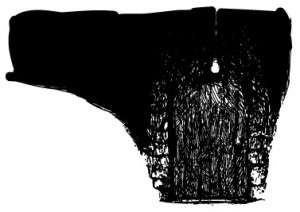This Cellar Thing
- Share
- Tweet
- Pin
- Share
The cellar is how our father spent winter, winter spent in the cellar of the farmhouse. After morning milking, after the barn was cleaned, after the snow was plowed, the heifers fed, watered. After the farm was tended, the fires stoked, our father retreated to the stonewalled cellar. In my childhood that cellar had a daunting aspect, without any extra imagination, a dungeon. Obvious were the monsters as might cohabit here. Were not the bins of potatoes already sneaking their skeletal fingers under the door, the shelves of our mother’s canned beets, tomatoes, cauliflower, string beans in the poor light of the cellar resembled body parts, severed fingers, eviscerated hearts. If there were farmhouses whose cellars had carpet and a pool table, more than two light bulbs, they seemed distant and very civilized compared to our demented stone cave.
Beyond the potato duhb (that’s a Scots’ word for dark), beyond specimen shelves of canned vegetables was the oversize pine board door that led to our father’s woodshop. This, his winter retreat, where he spent his afternoons till evening milking. Not that our father was a carpenter, more a wood tinker, occasionally a deliberate task, birch-paneled cupboards for the kitchen that took most of his winter. A new vanity and countertop for the bathroom, he wasn’t in a hurry to build anything, to my witness he lounged at projects, toyed with the boards to find an interesting grain, experimenting with stain and varnish.
Compared to the tools available to any modern woodshop, his were modest: an eight-inch table saw, a miter box, drill press, jointer, jack plane, block plane, a regiment of clamps, glue pot, chisels, a flock of hammers. No biscuit jointer, no thickness plane, no cordless drill, no Dremel, no drum sander, no band saw, orbital sander, platform sander, pneumatic hammer. Eventually to his great joy he bought a Porter and Cable router and soon after everything had edge trim. He would have put trim to potato boxes if the neighbors think it a trifle fancy.
The farmhouse was attended by a classical range of smells: potatoes frying, bread baking, lingering nearby always was hot chicken fat. Beyond was another olfaction perimeter of wood shavings. These woodshop smells came to that farmhouse in catalogued order, a Dewey Decimal System of smells; oak had an earthy scent like silage, pine smelled high and volatile, ash was musk-like, birch had a clear smell mindful of alcohol rub and Lutherans. Entering that house was to wade into an atmosphere of wood, a new window sash, a picket fence, a chest of drawers. His woodshop rattled of tools, the resident demi-god was the glue jar, only to add boiling water and stir. To the untutored this coven of tools resembled a jumble if more honestly a mess, but it was his haven. Our father never sang loud in public but could be heard more than vaguely musical when in his woodshop. That shop was his psychologist and counselor; he meditated all the ills and wrongs of the world behind that pine door at the far end of the cellar.
Eventually his shop got a radio, it took awhile before it didn’t feel invasive; happily, reception was not very good. He built cupboards, bookshelves, cabinets, towel racks, mopboard, more bookshelves. He built cedar chests from fence posts, he made bows and showed us how to fashion arrows by driving a blank of birch through the hole in a plowshare. Fletched with chicken feathers and a new mix of glue from that glue pot. Our mama was a Fletcher and accordingly, said our father, this was their trade, arrow smiths. I thought better of being a Fletcher after that.
All the while out there somewhere was winter, forty-below mornings when the barn froze solid as Neptune. We drained the tractor’s engine oil, the antifreeze too, heating them on the kitchen stove. Returned to the veins of the tractor, it eventually started, coupled to the manure spreader and did its daily circuit. Blizzards severed the farm from the world and we put the accumulating milk in buckets, barrels, antique milk cans, garbage cans, cherry cans until a day or two later the road was cleared. Once to hand shovel a quarter mile to get the milk truck through, and understood quite exactly how the pyramids were built. In between he went to the far end of the cellar. Sometimes just to read, Hoard’s Dairyman or Popular Science. Sometimes to find a warm space among the boards and go to sleep.
A niece once, she was from Chicago, had a baby, and it died. Remembering our father’s craft for she had his bookcase, she asked him to build a coffin. He never did that before. She wasn’t doing well herself, so rather than press the issue he built a coffin. Two days later a simple box. He debated whether of oak or pine if maybe butternut. In the end a plain box, no trim, finished with boiled linseed oil because varnish would not have time to dry. Saddest little box you ever saw. Mama cut apart a quilt to line the bottom, under the quilt our father hid a little arrow, I never did know what he meant by that. The box was plain pine, not too pretty because you have to bury it, which probably meant something.
Later our father got a band saw and a thickness planer. After selling off the last milk cows he spent more time in his workshop making band saw boxes ad-infinitum that he gave to any who’d have them. Nieces, nephews, grandchildren, great grandchildren all got these diminutive boxes. Another Christmas, another box, it became a kind of joke.
He would have turned a hundred and four come December. My son lives in the farmhouse, his wife cans beets and tomatoes, he does carpentry on the side. This cellar thing is contagious.


